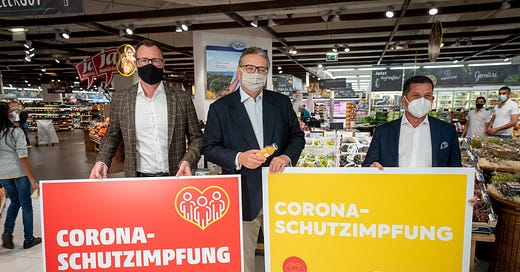61 Percent
The arguments for and against a nationwide vaccine mandate are another case of epidemiological and electoral concerns pulling politicians in opposite directions
Servus!
Two weeks ago, I wrote to you about the problem Austria presently faces of what to do with those who, even when offered the option of a vaccine on a silver platter, simply refuse to take it. Since that particular newsletter was published, the coronavirus situation here has not improved. Indeed, the pace of vaccination has continued to slow to the point where, in the state of Vorarlberg on Sunday, health authorities only administered a single first dose.
As of August 30, 61.52 percent of the population had received at least one dose, while the seven-day incidence rate per 100,000 people had climbed to 106.9. Austria is now regularly recording more than 1,000 new COVID-19 cases per day—case numbers are, it should be noted, around 12.5 times higher among the unvaccinated than the vaccinated—and the City of Vienna is now preparing for a situation in the fall where intensive care beds will need to be set aside for children under 12 infected with the virus.
As the Social Democratic Party (SPÖ) leader Pamela Rendi-Wagner said in her Sommergespräch on the state broadcaster ORF on Monday night, the current vaccination rate in Austria is simply too low to avoid another healthcare crisis in the fall. As the forecaster Niki Popper also told the ORF on Monday, there is no alternative to the vaccine, yet politicians across the spectrum have been reluctant to support or outright oppose introducing a nationwide vaccine mandate, with chancellor Sebastian Kurz preferring to lean on notions of individual responsibility and personal choice when it comes to vaccination.
The fourth wave has already begun in Austria, Rendi-Wagner said Monday. The number of intensive care patients has increased four-fold in the state of Upper Austria in recent weeks. The more infectious nature of the Delta variant, people returning from their summer holidays, and the impending start of the new school year are all factors pushing case numbers upward. The next two to three weeks will determine just how bad the fourth wave will hit the country, though this one should or could be different from the previous three, Rendi-Wagner said, because we finally have a tool with which we can protect ourselves: the vaccine.
Still, even she—doctor, epidemiologist, former health minister—would not come out in favor of mandatory vaccination. There should, Rendi-Wagner said, be mandates in certain employment sectors where the risk of infection is especially high and the consequences potentially very serious—in healthcare, for example, or in the care sector. But she would not endorse a broad vaccine mandate, believing it better to persuade people to get vaccinated using the right information and arguments rather than forcing it on people.
There is something to Rendi-Wagner’s case, given that, as the political communications researcher Jakob-Moritz Eberl has determined, though around 15 percent of the population are hardened anti-vaxxers, another 15-20 percent are potentially reachable and persuadable if the vaccine is offered to them in the right way. Yet Rendi-Wagner, Kurz, vice-chancellor Werner Kogler, and NEOS leader Beate Meinl-Reisinger are all also being sheepish about a mandate because of what it may mean for their respective political parties.
On September 26, voters are set to go to the polls in Upper Austria to elect a new state parliament. The vaccination rate there is the lowest in the country: only 56.85 percent of the population has had one dose and 53.65 percent two. The unvaccinated, then, constitute a sizeable reservoir of votes for all parties, but if they feel their hand is being forced into getting the jab, they are vulnerable to being driven into the arms of the anti-vax far-right Freedom Party (FPÖ)—vocal opponents of a vaccine mandate. A mandate may be unenforceable and perhaps unconstitutional, but Austria’s main parties are also afraid it may be a vote-losing issue. Once more, epidemiological and electoral concerns are two horses pulling in opposite directions.
Bis bald!
Thank you for signing up to the Vienna Briefing. If you know someone who would be interested in receiving this newsletter, consider sharing it with them today.
Strache Sentenced
The former vice-chancellor and FPÖ leader Heinz-Christian Strache was handed a 15-month suspended sentence by a court in Vienna, having been found to have helped amend a law in favor of a private healthcare concern whose head donated funds to the FPÖ. The judgement is not final and Strache plans to appeal.
Kurz Crowned
Chancellor Kurz was re-elected leader of the People’s Party (ÖVP) at last weekend’s party conference with 99.44 percent of the vote among delegates.
Hanke Hides
Vienna’s finance secretary Peter Hanke has ruled out becoming the next leader of the SPÖ. Both Hanke and the capital’s health secretary Peter Hacker have had their names floated in recent months as possible replacements for the under-fire Rendi-Wagner.




